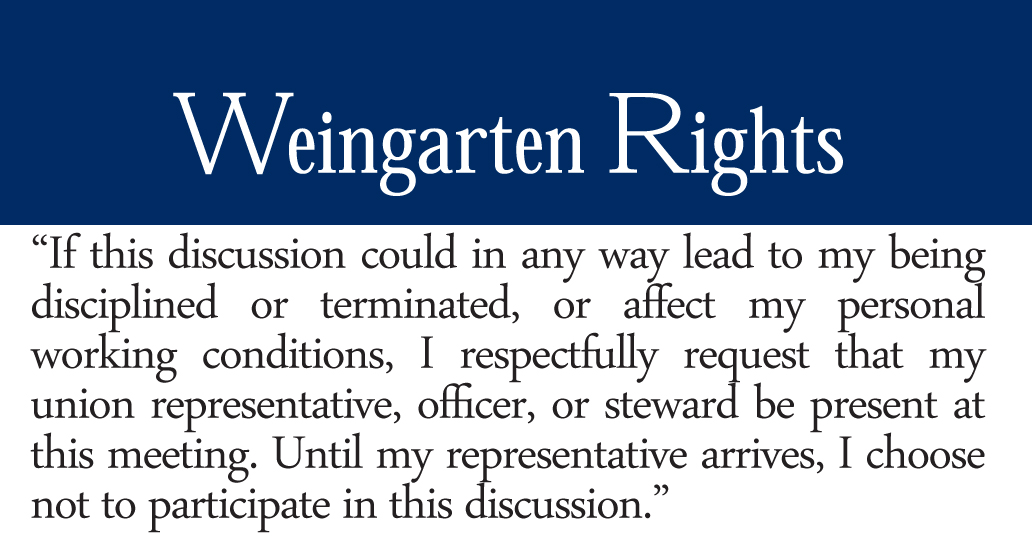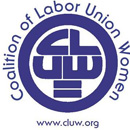
What are Weingarten Rights?
Weingarten rights guarantee an employee the right to Union representation during an investigatory interview if they have a reasonable belief that the investigatory interview will result in disciplinary action. These rights, established by the Supreme Court, in 1975 in the case of J'. Weingarten Inc must be claimed by the employee. The supervisor has no obligation to inform an employee that s/he is entitled to Union representation.
· The case is based on an employee who worked at a food outlet operated by J. Weingarten, Inc. She was summoned to an interview with supervisors and questioned about failing to pay full price for a box of chicken. The employee, a member of the Retail Clerks Union, asked for a union representative several times, but her request was refused by the manager each time. The employee reported what had happened to her shop steward and other union representatives. As a result of her being denied a union representative, an unfair labor practice charge was filed with the National Labor Relations Board, and the ruling in favor of the employee was appealed numerous times until it went before the high court.
What is an Investigatory Interview?
Employees have Weingarten rights only during investigatory interviews. An investigatory interview occurs when a supervisor questions an employee to obtain information which could be used as a basis for discipline or asks an employee to defend his or her conduct. If an employee has a reasonable belief that discipline or other adverse consequences may result from what he or she says, the employee has a right to request union representation. Investigatory interviews usually relate to subjects such as...
- absenteeism
- drinking
- fighting
- poor attitude
- violation of safety rules
- accidents
- drugs
- insubordination
- sabotage
- work performance
- damage to state property
- falsification of records
- lateness
- theft
- violation of work procedures
If you are brought in for questioning a suggested standard statement is: "If this discussion could in any way lead to my being disciplined or discharged, I request that my Union Representative be present at the meeting. Without representation, I choose not to answer any questions."
Management’s options upon your request for Union Representation
After a valid request, the supervisor must:
- Grant the request and delay the interview until the Union representative arrives and has a chance to consult privately with the employee: or
- Deny the request and end the interview immediately. If the supervisor denies the request and continues to ask questions, this is an unfair labor practice and the employee has a right to refuse to answer. The employee cannot be disciplined for such refusal but is required to sit there until the supervisor terminates the interview. Leaving before this happens may constitute punishable insubordination; or
- Give the employee a Choice of: 1. having the interview without representation or 2. ending the interview.
Frequently Asked Questions Regarding Weingarten Rights
Do Weingarten rights apply automatically? –No, the supervisor is not required to inform the employee of his/her rights. The employee must request representation when they reasonably believe it will result in discipline AND when a valid request for a representative is made (you need both). Nor must the employee repeat a request for representation. Where an employee has been advised that disciplinary action will not be taken, Weingarten rights will not apply.
Can Weingarten rights be waived? –Yes, but an employee’s waiver of Weingarten rights must be made knowingly and voluntarily, and it must be clear and unmistakable.
Is it a violation to discipline an employee for invoking his/her Weingarten rights? –Yes, it is a violation of the National Labor Relations Act to discipline an employee for invoking his/her Weingarten rights. Similarly, it is a violation for an employer to discipline an employee for refusing to waive his/her Weingarten rights.
Do you have to attend a meeting if ordered? –Regardless of whether you get representation or not, you need to appear at the appointed time and place. Upon questioning, immediately reiterate your request – and make sure everything gets on the record;
Who can be your rep.? –An employee has the right to have a union representative. If the chosen union representative is not available, the employee must be provided an alternative representative if requested.
May the representative participate in the interview? –Yes. Union Reps. have active roles to play. They may speak privately with the member before the interview, must be advised of the interview subject matter by management, request that the supervisor clarify questions, give advice and counsel the employee on how to answer the questions, and provide additional information to the supervisor at the end of the questioning. The Union Representative does not have the right to tell the employee not to answer nor, obviously, to give false answers.
Take notes– All reps. should take detailed notes, recording everything that is said, by whom, and any intimidation or other unlawful tactics.
An employee has NO right to the presence of a Union representative where:
- The meeting is merely for the purpose of conveying work instructions, training, or communicating needed corrections in the employee's work techniques.
- The employee is assured by the employer prior to the interview that no discipline or employment consequences can result from the interview.
- The employer has reached a final decision to impose certain discipline on the employee prior to the interview, and the purpose of the interview is to inform the employee of the discipline or to impose it.
- Any conversation or discussion about the previously determined discipline which is initiated by the employee and without employer encouragement or instigation after the employee is informed of the action.
Even in the above four (4) circumstances, the employee can still ask for representation. Most employers will permit a representative to attend even when not required to.
Spreading The Word
Unfortunately, the Supreme Court did not require employers to tell workers about their right to union assistance, as it did in the Miranda decision covering police interrogations. The union must educate members about their Weingarten rights BEFORE an occasion to use them arises.
*Laws are subject to change this is an informational post only, it is not legal advice.











